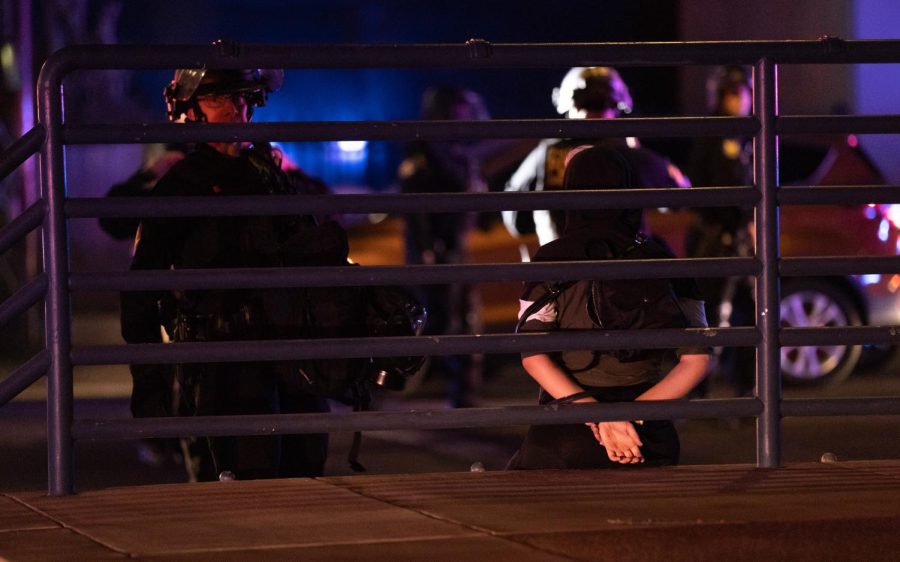Media organizations fight bill from Az. GOP representative signed into law by Gov. Ducey that would make it illegal to film police officers without their permission—law currently blocked by federal judge pending outcome of court case challenging it
Law seen by media organizations and majority of the public as clear violation of First Amendment protections
Jason White – Northeast Valley News Photojournalist
Phoenix Police being filmed and photographed by Northeast Valley News during Black Lives Matter protest summer 2020
November 28, 2022
After Minneapolis police officer Derek Chauvin was found guilty of killing George Floyd in 2021, the public’s right to film video of police arrests and even roadside law enforcement stops has taken center stage by showing up in court cases and used against police officers across the nation.
But the right of the public to video tape often violent and unnecessary force by the police via tasers, physical restraint and even deadly weapons is now being challenged even though police officers in the U.S. are killing people at an alarming rate according to Mapping Police Violence.
America is still averaging three deaths a day at the hands of police—an eerily disturbing statistic that echoes those of recent years and despite Chauvin being found guilty on all three charges brought against him.
After the Floyd killing, the popular slogan and sentiment to “defund” police departments was being hailed across the nation—the cry for defunding met resistance from Republicans and the far right as they began their own campaign to increase police funding despite alarming deadly force statistics.
In Arizona, one Republican lawmaker and former cop, introduced a bill this year making it illegal to record an officer within eight feet and without their permission with the passing of HB2319.
The bill was supported by the Az. GOP and quickly signed into law by Gov. Doug Ducey on July 6 and set to take effect on Sept. 24.
Arizona State Representative, John Kavanaugh, the GOP legislator who sponsored the bill said it would create a safer environment for officers with less distractions and possible threats.
Since the original reading, the new bill will allow a driver and passenger to record as long as they don’t interfere or are not in the process of being arrested themselves. Kavanagh mentioned this new addition could promote further officer safety.
“If I was a cop and there were people in the back seat of the car I would much rather them hold cell phones, looking at me than out of my view possibly drawing a weapon,” Kavanagh said.
Soon after Ducey signed the bill into law, Judge John Tuchi blocked the law stating that it would oppose the First Amendment rights—this following lawsuits from state and national media outlets and organizations across the nation.
Matt Kelly, the attorney representing the media said, “I’m pleased that the judge recognized that this law is very likely unconstitutional on its face and it’s a great win for both journalists and anybody else in Arizona who wants to simply exercise their First Amendment right to record video of law enforcement performing their duties in public.”
Democratic State Representative, Reginald Bolding, also believes the bill would violate the freedom of press stating that the use of phone cameras “has provided this world an opportunity to see what happens every day in many communities.” He said this would ensure a fair balanced enforcement.
The Supreme Court has historically recognized newsgathering to include the recording of government officials as well as police officers according to ACLU filings.
“One of the best tools available to hold law enforcement accountable is a video camera —in other words, the right to record. The First Amendment protects our right to record police engaged in official duties. Every federal circuit to consider the right to record — seven out of 13 circuits — has held that this right clearly exists, and most have specified that it applies to law enforcement,” from the ACLU news regarding this law.
So far, the actual legal defense of the law in court is sparse—if any.
Even though every Arizona GOP legislator supported the law, both Arizona Attorney General Mark Brnovich and County Attorney Rachel Mitchell (both named in the lawsuit) said they will not defend the law in court.


